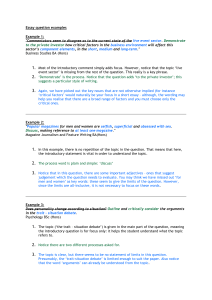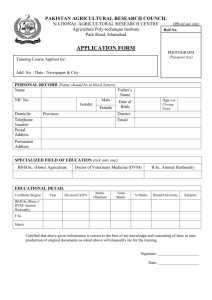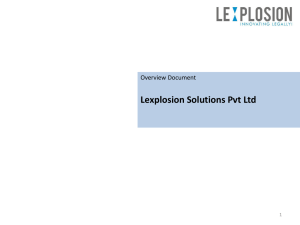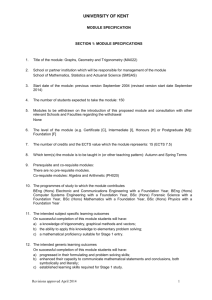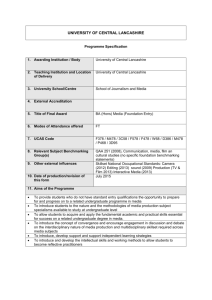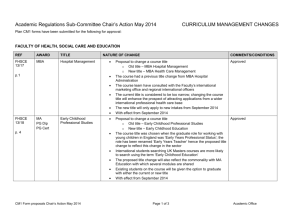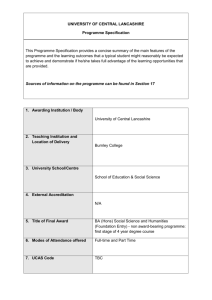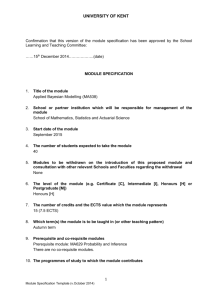Global Media Practice - Bournemouth University
advertisement
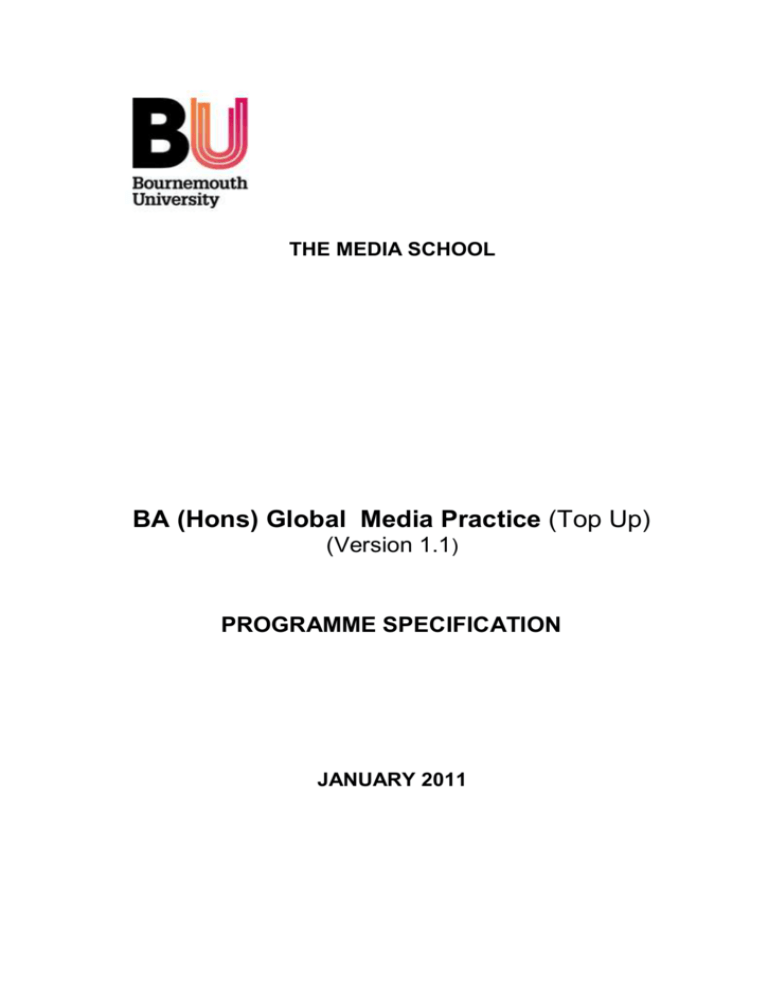
THE MEDIA SCHOOL BA (Hons) Global Media Practice (Top Up) (Version 1.1) PROGRAMME SPECIFICATION JANUARY 2011 © 2009 Bournemouth University Document date: January 2011 Circulation: General Bournemouth University undertakes to encourage the recognition, protection and exploitation of intellectual property rights generated by participants in this programme, to the benefit, as appropriate, of students, staff, industrial/other third parties/partners and the university. BA (Hons) Global Media Practice Programme Specification: Version 1.1 January 2011 - 2 BASIC FRAMEWORK / PROGRAMME DATA Originating institution(s) Bournemouth University Award(s) and title(s) BA (Hons) Global Media Practice UCAS Programme Code(s) P390 External reference points(s) The Framework for Higher Education Qualifications. Communication, media, film and cultural studies QAA Subject Benchmark statement (2008) Skillset Professional, Statutory and/or Regulatory Body links None Place(s) of delivery Bournemouth University Mode(s) of delivery Full-time Credit structure Level H: 120 (ECTS: 60) Duration 1 year Date of original approval 2010 Date of first intake September 2010 Placements 4 weeks Partner institution(s) and model(s) None Date and version number of this Programme Specification Version 1.1: January 2011 Version number of this document: This Programme Specification was approved in January 2010 following validation by Academic Standards Committee. It takes effect from September 2010 and applies to all new enrolments. Version 1.1 was produced to reflect amended admission regulations to take account of approved internal progression routes and recognition with advanced standing. BA (Hons) Global Media Practice Programme Specification: Version 1.1 January 2011 - 3 AIMS OF THE DOCUMENT The aims of this document are to define the structure of the Level H top-up BA (Hons) Global Media Practice. In addition, to identify the programme learning outcomes, learning and teaching methods, assessment methods, and to articulate the regulations governing the award offered by the programme. BA (Hons) Global Media Practice Programme Specification: Version 1.1 January 2011 - 4 ACADEMIC AND PROFESSIONAL CONTEXTS This is a proposal for a one-year level H top-up degree to be delivered by the Media School, Bournemouth University. Located within the Media Academic Group, it will align with their undergraduate framework by sharing the dissertation unit, and developing the growing expertise in the group in the area of cross-platform production. This programme seeks to recruit students in order to foster and develop their understanding of the evolving media landscape on a global scale. This will be achieved by a mix of group-work and individual authorship, practical projects, theory and work experience, in the areas of interactivity, radio, and television / video production. Students accepted onto the programme will already have studied an area of media communication practice, radio, video production, or multimedia, and will develop skills in these areas in the context of convergence, and the global media environment. The rationale for the proposal is to develop our growing relationships with international colleges by responding to leads developed by the School’s head of international relations. This response to need draws together the following threads: The wish to diversify and enrich the undergraduate student experience by developing a larger international student constituency in the Media School; To align with the BU internationalisation strategy, and as such to provide a programme that, by its very nature, engages “with a culturally rich learning environment and to celebrate [the students’] diversity” (BU Internationalisation Strategy Document); Responding to the BU Strategic Plan that assumes strong growth in international recruitment, and the BU Corporate Plan that stipulates that by 2012 “Bournemouth University is a youthful and innovative international institution”; To align with the Education Enhancement strategy, specifically the themes “Employability and preparation for graduate-level work” and “Internationalisation, Global Perspectives and Sustainable Development”. Increased opportunities to help students ‘flow’ from undergraduate study to post-graduate study. The programme that has been developed aligns with the Framework for Higher Education Qualifications (FHEQ), and has been largely informed by the QAA Subject Benchmark statements for Communication, Media, Film and Cultural Studies. BA (Hons) Global Media Practice Programme Specification: Version 1.1 January 2011 - 5 AIMS OF THE PROGRAMME BA (Hons) Global Media Practice aims to produce graduates who are informed, critical and creative in their approach both to understanding media, culture and communications in contemporary society, and to their own forms of media, communicative and expressive practice. Whilst the programme is committed to enabling students to meet the challenges of employment in a society in which cultural and communications industries play an increasingly central role, it emphasises the fostering of employability gained from developing students’ creative, intellectual, analytical and research skills. The overall aims of the programme are: To develop in students, through practical experience, the production authorship skills and techniques to initiate, develop and realise distinctive and original media artefacts that have global currency; To help students, through the synthesis of production activity and theoretical analysis, to locate their work in an aesthetic, cultural and international context; To enable students to be able to communicate and work confidently both in teams and independently; To provide students with a substantial range of transferable skills in group working, independent research, IT, problem solving, report writing and project management as a basis for professional activity and development which may be applicable in other career areas; To provide students with the opportunity and desire to exhibit their production work to an external audience; To enable students from a wide range of differing media production backgrounds the opportunity to apply their skills and creative ability to the developing, globalised crossplatform environment. INTENDED PROGRAMME OUTCOMES ILOs for programmes and terminal awards are specified in terms of four categories: ‘subject knowledge and understanding’, ‘intellectual skills’, ‘practical skills’ and ‘transferable skills’. A SUBJECT KNOWLEDGE AND UNDERSTANDING This programme provides opportunities for students to develop and demonstrate: A1 a critical understanding of key concepts, ideas and theories relating to the development of media and cultural forms in a local, community, regional, national, international or global context; A2 an understanding of how narrative processes, disability, class, ethnicity, gender, religion, nationality, sexuality and other divisions play key roles in terms of both access to the media and modes of representation in media texts; A3 a critical understanding of industry standard practices as applied to the initiation, development, production and realisation of their project(s); A4 a comprehensive understanding of professional and theoretical contexts and how they inform their practice. BA (Hons) Global Media Practice Programme Specification: Version 1.1 January 2011 - 6 B INTELLECTUAL SKILLS This programme provides opportunities for students to: B1 apply theory to the analysis of media examples or phenomena; B2 critically evaluate theoretical models and methodologies through independent study and research; B3 gather, organise and deploy ideas and information in order to formulate arguments cogently, and express and defend them effectively; B4 define and apply an appropriate research topic and framework; B5 demonstrate an ability to articulate a thesis, and structure an argument appropriately in the form of a detailed and coherent piece of written academic research. C PRACTICAL SKILLS This framework provides opportunities for students to: C1 demonstrate, through engagement in production practice, their understanding of their own creative processes and practice; C2 demonstrate an ability to initiate, develop, and realise distinctive and creative work within various forms including aural, visual, audiovisual, sound, or other electronic media; C3 demonstrate an ability to provide specialist skills and knowledge to work effectively in a group to aid the production of innovative cross-platform media solutions; C4 demonstrate their grasp of professional, technical and formal choices which realise, develop or challenge existing practices and traditions, and of the possibilities and constraints involved in production processes. C5 be adaptive, creative, and self-reflexive in producing output for a variety of audiences and in a variety of media forms; D TRANSFERABLE SKILLS This programme provides opportunities for students to: D1 demonstrate an ability to work independently and collaboratively showing skills of negotiation and compromise; D2 demonstrate the ability to evaluate their work in a reflexive manner; D3 demonstrate skills in communicating effectively orally and in written form, within both academic and professional contexts; D4 demonstrates skills of adaptability and flexibility; D5 demonstrate the ability to deliver work to a given brief and deadline. BA (Hons) Global Media Practice Programme Specification: Version 1.1 January 2011 - 7 LEARNING AND TEACHING STRATEGIES AND METHODS Subject knowledge and understanding competencies are acquired via large group lectures, interactive-focussed seminars, and tutorials (individual and group) as well as by putting into practice individual and group-based assignments. Intellectual skills are learnt predominantly via active involvement in seminars, and through their application and reflection on individual written assignments, presentations, and essays. Practical skills are learnt through participation in lectures, seminars, workshops, tutorials (individual and group), as well as through group work and individually authored projects. Transferable skills are not so much taught as learnt through practice, through exercises designed to develop their sense of ‘academic assertiveness’, and their overall confidence with coursework and the expectations of Higher Education. Working in individual and group-based scenarios to complete coursework assignments will ensure students apply, reflect, and learn from group-work, enabling them to work flexibly, and to given briefs and deadlines. It is important that students are provided with the space (physical and intellectual) to allow them to try, to test, to reflect, and therefore to grow as independent life-long learners. That is the life-blood of transferable skills. Learning and teaching methods are specific in more detail in unit specifications. ASSESSMENT STRATEGIES AND METHODS The programme employs a varied diet of assessment, aligning assessment mechanisms to learning outcomes to ensure that they are appropriate. As a practice-based media degree, which tends to lean towards coursework as opposed to examinations, it is important to note that one assessment type omitted from the diet of assessment is the examination – all aspects of the curriculum are assessed via coursework submissions, either group-based projects and presentations, or individual essays and written reports. Knowledge and understanding intended learning outcomes are assessed predominantly with essay writing and presentations (A1 – A5). Intellectual skills (B1, B2, B4, B5) are assessed with essays, whilst B3 is assessed via a presentation / pitch. Subject specific skills are assessed via submission of artefacts, including individual and group-based projects (C1 – C5). Transferable skills are assessed by both primary and tertiary means. Examples of the former include practical project submissions, and successful completion of project briefs. Examples of the latter include timekeeping, professionalism, and being a responsible learner. Whilst these latter categories are not summatively assessed, they are very important (D1 – D5). Assessment methods are specified in more detail in unit specifications. WORK-BASED LEARNING (WBL)/PLACEMENTS ELEMENTS The programme includes a mandatory four week placement that should take place in the final term, to conclude the student learning experience. This is a Pass / Fail element of the programme based on a submission of a completed placement logbook including an employer’s report. BA (Hons) Global Media Practice Programme Specification: Version 1.1 January 2011 - 8 PROGRAMME DIAGRAM PROGRAMME DIAGRAM BA (Hons) Global Media Practice Level H Core units (Compulsory) Option units The Global Media Environment (20) Voice, Reach and Impact (20) Cross-Platform Projects (40) The Dissertation (40) None Exit qualification: BA (Hons) Global Media Practice Requires 120 Level H credits, and satisfactory completion of 4 week mandatory work placement ADMISSION REGULATIONS The regulations for this programme are the University’s Standard Undergraduate Admissions Regulations, with the following amendments: A merit profile in FDA / HND or equivalent; Applicants from programmes which have approved recognised advanced standing arrangements or approved internal progression will be expected to provide evidence of attainment at a level of GPA 3.5,or its equivalent as ‘Merit’, ‘Grade B’ or ‘70% +’, depending on the grading scheme of the qualification, or equivalent Foundation Degree or HND. All applicants whose first language is not English must in addition offer evidence of qualifications in written and spoken English. Acceptable qualifications are IELTS (Academic) 6.5, or TOEFL 90 (internet-based) or 575 (paper-based). Admission onto the programme is subject to the APL procedure where candidates’ prior learning must be demonstrably congruent with the following learning outcomes: Subject Knowledge and Understanding: A critical appreciation of the developing media industry; An understanding of theoretical and professional debates that inform and question evolving media practice; Intellectual Skills: Apply theory and contextual analysis, think critically and evaluate work undertaken, critically research aspects of the media and apply their own thinking informed by an appropriate range of sources; Practical Skills: Practical and industry-focused experience of media practice in either moving images, audio, and / or interactive media disciplines; BA (Hons) Global Media Practice Programme Specification: Version 1.1 January 2011 - 9 Transferable Skills: Group working including leading and of being led by others; IT skills; Problem solving skills. ASSESSMENT REGULATIONS The regulations for this programme are the University’s Standard Undergraduate Assessment Regulations. BA (Hons) Global Media Practice Programme Specification: Version 1.1 January 2011 - 10 PROGRAMME PROFILE Originating Institution(s): Bournemouth University Place(s) of Delivery: Talbot Campus School: The Media School Programme HESA JACS code: Partner institution: N/A Framework Title (in full): Media Production Undergraduate Framework Mode(s) of study: FT Programme Award and Title: BA (Hons) Global Media Practice Expected Length of study : 1 yr Interim Award and Titles & required credits: N/A BU Credit Structure & ECTS : Level H 120 (60 ECTS) Cost Centre(s) Unit identification Unit version no. MS-BAGMP-U-H-0219 MS-BAGMP-U-H-0220 MS-BAGMP-U-H-0221 MS-MPUG-S-H-0027 Unit name The Global Media Environment Voice, Reach and Impact Cross-Platform Projects The Dissertation Work Placement* HESA JACS Subject Code P300 P310 P420 P300 CC 1 30 30 30 30 % HESA JACS Subjec t Code Unit Details CC2 % 100 100 100 100 Prog year FT 1 1 1 1 1 Effective from Prog Year / Month / Year Yr. 1 Sept 2010 Contact in School: Date approved : Jan 2010 Yr. 2 Yr. 3 Name of Professional, Statutory or Regulatory Body (if appropriate) : N/A James Jordan (65846) Prog year PT Core / option Core Core Core Core Core No of credits 20 20 40 40 0 Programme Specification version no: 1 Assessment Regs : Level (C,I,H, PgC, PgD, M) Assessment Element Weightings Exam 1 H H H H H C/Work 1 100 100 100 100 P/F C/Work 2 Placement : 4 weeks (Core) Diploma Supplement Statement regarding PRSB accreditation : * Successful completion of the work placement is a graduation requirement BA (Hons) Global Media Practice Programme Specification: Version 1.1 January 2011 - 11

